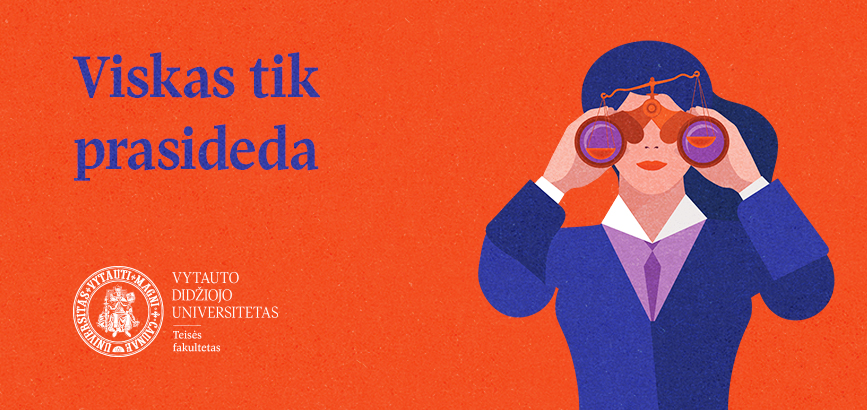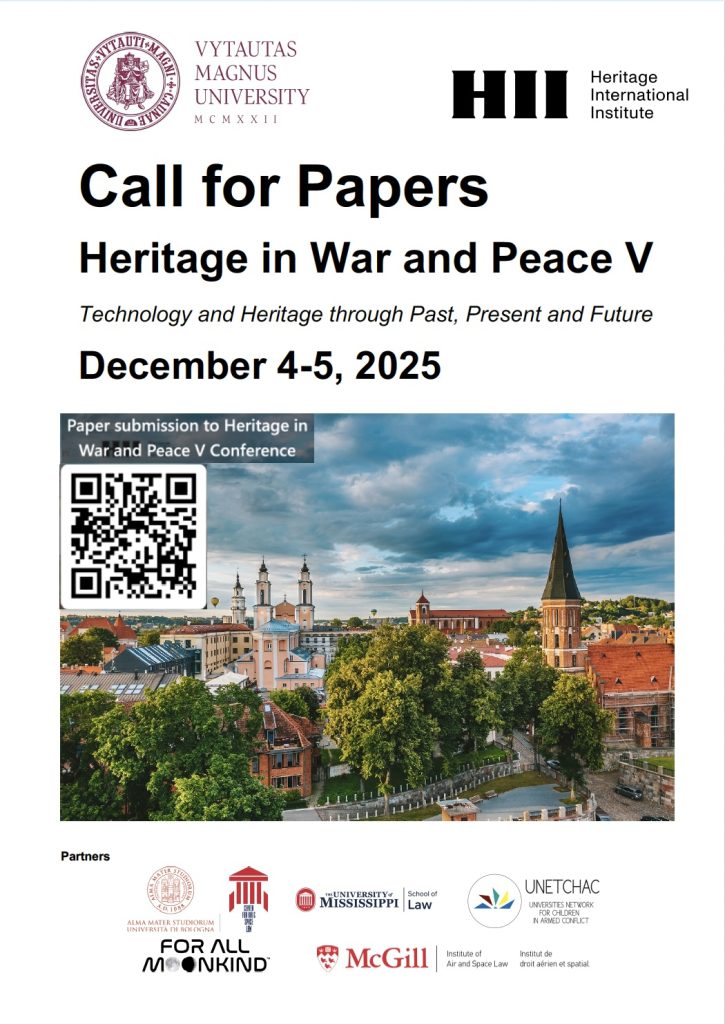Call for Papers. Heritage in War and Peace V: Technology and Heritage through Past, Present and Future
Vytautas Magnus University Faculty of Law, Department of Public Communication, and Vytautas Kavolis Transdisciplinary Research Institute and Heritage International Institute (HII), in partnership with the University of Roma Tre (TBC), the McGill University’s Institute of Air and Space Law (IASL), the University of Mississippi, ‘For All Moonkind’, the Universities Network for Children in Armed Conflict (UNETCHAC) and One Ocean Hub kindly invite you for the fifth edition of the International Conference ‘Heritage in War and Peace’.
What is the International Conference on Cultural Heritage ‘Heritage in War and Peace’?
The annual Conference gathers leading global experts on heritage, from all regions of the world, with the aim of developing innovative approaches to heritage and direct dialogue among all the relevant stakeholders.
The event aims at looking in greater depth at the very notion of cultural and natural heritage, proposing to focus on diverse aspects of heritage protection in conflict and peace, conceptualize more critically the notion of tangibility and intangibility, address all kind of heritage issues – such as conflict-related heritage destruction, digital transformation, and climate threats – and put forward innovative ways to deal with heritage preservation and management.
In line with Heritage International Institute mission, the Conference wants to contribute to guarantee peace and international security, human rights and sustainable development, by exploring innovative approaches and promoting policy responses for a more effective protection of heritage, all over the world and under every circumstance, both in time of war and peace.
The objective is also to build cultural bridges between countries and people, celebrating cultural diversity, and sharing knowledge and experiences, leading to a deeper and more enriching understanding of the cultural world around us.
Why ‘Heritage in War and Peace’?
Following the success of the first four editions organised at the Sapienza University in Rome (December 2021), McGill University in Montréal (November 2022), the University of Bologna (January 2024), and the University of Strathclyde (December 2024) as well as the successful publication of the monograph collecting selected conference papers, ‘Heritage in War and Peace. Legal and Political Perspectives for Future Protection’, the interdisciplinary conference is now coming to Kaunas, Lithuania for its next iteration.
What is the theme of this year’s edition?
As stated by UNESCO ‘Digital technologies have a profound impact on our lives, including the way we experience and access culture. As cultural practices and irreplaceable heritage of humanity face novel challenges such as climate change, unsustainable developments and growing tourism, innovations can offer solutions.
Digital and new technologies, including artificial intelligence, virtual reality, block chains, data networks, cloud computing, mobile applications, smart sensors, have become crucial for the creation, preservation and transmission of knowledge. Within this evolving technological ecosystem, which also raises unprecedented risks, cultural heritage finds itself at a crossroads.
On the one hand, digital and new technologies offer innovative advancements in documenting, preserving, accessing, and experiencing cultural heritage. Information Technology (IT) and Information and Communication Technology (ICT) could significantly contribute to safeguard and promote cultural sites, including the World Heritage ones, and intangible heritage, with a view to transmitting them to future generations. New technologies enable the creation of immersive and interactive experiences, such as virtual museums, that enhance public engagement, community participation and education and facilitate remote access to collections and sites. Such technologies also allow monitoring of environmental threats and detecting of illicit trafficking of cultural objects.
On the other hand, such technologies present multifaceted challenges to heritage, including those related to digitization processes, digital obsolescence, accessibility, copyright and ownership, sustainability, ethical use, digital divide, disparities in digital infrastructure. Moreover, cybersecurity is a crucial element that must be considered for ensuring the integrity, authenticity, and protection of digital heritage assets from tampering, loss, or malicious attacks – especially when heritage data is stored, shared, or accessed through online platforms and cloud-based systems. Immersive environments, such as the metaverse, raises also new questions about the authenticity and ethical curation of cultural content in virtual spaces, risking distorting historical narratives or prioritizing commercial over cultural values.
The situation is even more complex when it comes to armed conflicts, where cyber warfare, drones and autonomous weapon systems are often used to target and damage cultural sites. In post-conflict or post-disaster scenarios, digital reconstruction sparks intense debate: does virtual restoration risk replacing or devaluing the original, or can it serve as a powerful tool for memory, education, and community healing?
In the context of cyberwar, cultural heritage faces growing risks as digital repositories, archives, and databases can become deliberate targets of cyberattacks aimed at erasing cultural memory. Addressing these risks requires the strategic use of emerging technologies, not only to safeguard digital and digitized heritage, but also to ensure its long-term preservation, integrity, and accessibility for future generations.
Rapid technological advancements may also outpace existing laws and regulations, making it harder to legally protect cultural heritage. Building proposals for future strategies at the intersection of heritage and technology is more necessary than ever before, also considering the intricate relationship between geopolitical events and the role of digital strategies in safeguarding and showcasing cultural heritage globally.
That is why, this year’s edition is organised under the general theme of ‘Technology and Heritage through Past, Present and Future’. In line with their mission and their future-focus and interdisciplinary approach, Heritage International Institute and Vytautas Magnus University aim at identifying new measures and tools that use new technologies in favour of heritage, also raising awareness on the importance to fully guaranteeing cyber security.
Will all the panels have a technology focus?
Not necessarily. We invite all the participants to follow an integrated and comprehensive approach to heritage (archaeology, landscape, architecture, design, fashion, music, dance, theatre, cinema, photography, traditional sports and games, accessibility and inclusion strategies) with a possible special focus on new technology. In the belief that the benefits of heritage can only be fully realized through a truly inclusive vision, encourage consideration of the complex interconnections between the social, cultural, environmental, and economic dimensions of diverse cultures. This approach will offer unprecedented opportunities for the preservation of heritage as irreplaceable source of knowledge, growth, identity, while also opening the path for ground-breaking cultural services and possibilities.
What is the Virtual Museum on Cultural Heritage?
In the belief that digital language can be a fundamental tool for promoting the importance of human rights and cultural heritage, at the same time providing a further possibility of conservation, the event will also host the Virtual Museum on Cultural Heritage, promoted by the Italian Ministry of Foreign Affairs and International Cooperation together with the Italian Ministry of Culture. The Virtual Museum, officially recognized as a good practice in the Human Rights Council’s Resolution A/HRC/58/L.4/Rev.1, is the first initiative at a global level on such an important topic, offering an example of digital interpretative exegesis of cultural heritage that combine different digitisation models and clearly shows the advantages of digitisation in the cultural sector. The Virtual Museum also encourages access for all to cultural heritage in order to stimulate human rights, particularly cultural rights and contributes to enable older generations to approach the digital world and make cultural sites accessible to people with motor difficulties.
How will young researchers be supported?
Papers by young scholars and early career researchers will be considered by members of the academic committee for a selection of prizes (details will be provided at a later date).
How to submit a paper proposal?
We invite you to engage with the above-mentioned heritage-related themes by preparing a 250-word abstract by August 31, 2025 and submitting it through a dedicated form. This year once again we ask you to specify which session best fits your paper in your opinion when submitting the proposal. Please note that exploration of the intersections between heritage and technology are encouraged in all panels. The submissions will be considered on a rolling basis from June.
❖ Heritage and Emerging Digital Technologies – Special Session (co-chairs: Julija Kalpokienė & Ignas Kalpokas)
❖ Heritage and Digital Humanities – Special Session (co-chairs: Ignas Kalpokas & TBC)
❖ Heritage in War and Peace – General Session (co-chairs: Gianluigi Mastandrea Bonaviri & Mirosław M. Sadowski)
❖ Different Dimensions of Water and Heritage (chair: Gianfranco Nucera)
❖ Nature and Heritage (chair: Luca Cetara)
❖ Law, Culture and Politics in Heritage (chair: Mirosław M. Sadowski)
❖ Archaeology and Heritage (co-chairs: Gianluca Miniaci & Camilla Saler)
❖ Heritage, Human Rights and Vulnerable Groups (co-chairs: Laura Guercio & Andrea Sòcrati)
❖ Heritage, Restitution and Trafficking (co-chairs:): (co-chairs: Maria Font & Isabella Salsano)
❖ Heritage, History and Country Case Studies (co-chairs: Tania Atilano & Nora Weller)
❖ Outer Space Perspectives for Heritage (co-chairs: Michelle L. D. Hanlon & Andrea Harrington)
❖ International Humanitarian Law, International Criminal Law and Heritage (co-chairs: Ahmed Khalifa and Martin Faix)
❖ Heritage, Landscape and Architecture (co-chairs: Maria Teresa Idone, Giovanna Piccinno & Luca Cetara)
❖ Heritage, Design and Arts (co-chairs: Luca Fois, Giovanni Conti, Enrico Carrocci, Veronica Pradaelli & Giorgia Fiorio)
❖ Heritage, Tourism and Food (co-chairs: Gianluca Frinchillucci)
❖ Heritage and Digital Twins (chair: Davide Scalmani)
❖ Intellectual Property Rights and Cultural Heritage (co-chairs: Dominik Światkowski and Julija Kalpokienė)
❖ Special Roundtable* Heritage Law and Digital Preservation (co-chairs: Marie Sophie de Clippele & Mirosław M. Sadowski)
❖ Special Roundtable* Ceremonies and Rituals of Authority in Legal and Political Systems (co-chairs: Larry Catá Backer, Martin Belov & Mirosław M. Sadowski)
* Special Roundtables both have more detailed Calls for Papers (below).
What is the key information?
CfP deadline: August 31, 2025 (submissions considered on a rolling basis)
Abstract word limit: 250 words
Abstract submission form
Conference dates: December 4-5, 2025
Conference location: Vytautas Magnus University, Kaunas, Lithuania
Conference format: in-person (hybrid allowed only in specific circumstances)
Email contacts: ignas.kalpokas@vdu.lt; julija.kalpokiene@vdu.lt
Conference fee: TBC (the fee is unlikely to exceed EUR 100.00)
More information – Call for Papers Heritage in War and Peace V














